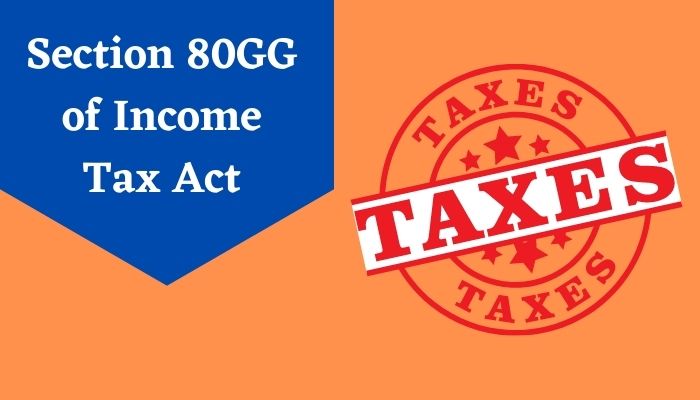Section 80GG of Income Tax Act
If you are paying your taxes on time every year, then you should also be aware of the different benefits that you can get while paying taxes. This includes getting deductions under Section 80GG of the Income Tax Act.
But what if you haven’t even heard about Section 80GG of the Income Tax Act? In that case, you have nothing to worry about as we have got you covered. Today, we’ll take you through everything that you need to know about Section 80GG tax deductions.
Understanding Section 80GG Deductions
It should be noted that individuals can claim income tax deductions against the rent that one pays. This can be done even if HRA (House Rent Allowance) is not a part of the salary package of the individual.
One can claim this deduction against the rent that he or she pays every month under Section 80GG of the Income Tax Act. On the other hand, if HRA is part of an individual’s salary package, then one can claim tax benefit under Section 10 (13A).
There are also some other terms and conditions that a taxpayer has to meet before he or she can avail of benefits under Section 80GG. These terms and conditions are:
- Salaried individuals, self-employed, and Hindi Undivided Families (HUFs) can claim a deduction under this section
- Companies cannot claim a deduction under Section 80GG
- In order to claim Section 80GG deduction, HRA should not be a part of the overall salary package of an individual
- One should not claim a tax deduction for a rented accommodation that is owned by the taxpayer’s spouse or minor child
- To claim Section 80GG deduction, the rented home should not be used to carry out any work activity or business
- A taxpayer cannot claim a deduction under Section 80GG of the Income Tax Act if he or she owns a self-occupied property in a different city
Calculating Section 80GG Deductions
A taxpayer can claim the least of the components that are mentioned below.
- 25% of the total income, which excludes any long and short-term capital gains
- Actual rent paid minus 10% of the total income
- INR 60,000 a year or a minimum of INR 5,000 per month
It should be noted that before 2016 – 2017, this limit was INR 24,000 a year.
Information Required for Filling in Form 10BA to Claim HRA
If an individual wants to claim the deduction benefit under Section 80GG, then he or she has to fill out Form 10BA. This form must be filled out by an individual who wants to claim a tax deduction under Section 80G for rent paid on rental property. The details required for filling this form are:
- Name of the tenant
- Address of the tenant
- PAN number of the tenant
- Monthly rent
- Mode of payment
- Name of the landlord
- Address of the landlord
- Landlord’s PAN Number if the rent is higher than INR 1 lakh in a year
Beyond this, there is also a declaration that has to be filled by the assessee who is claiming a deduction under Section 80GG. In this declaration, the individual will certify that the information shared by him or her is correct and that she or he has occupied the premises for the purpose of residence in the last year.
It should also be noted that the taxpayer must be able to provide rent receipts from the period for which he or she has paid the rent. This is specifically true in cases where individuals pay a monthly rent that exceeds the amount of INR 3,000. If you don’t have monthly rent receipts, then that is also okay. Individuals can choose to share quarterly, half-yearly, or annual rent receipts.
One should remember to affix a revenue stamp on each rent receipt. This is true for cases in which a cash payment of more than INR 5,000 per receipt has been made. If the payment has been made through a cheque, then no revenue stamp is required.
Deduction Limits Under Section 80GG
If an individual compares the tax benefits offered under Section 10 (13A), then the limits imposed under Section 80GG appear to be quite low. In most cases, taxpayers are not able to claim a deduction of more than INR 60,000 in a year under this section. This is mainly because the average rents have grown exponentially across all the major cities in India, including Tier-II and Tier-III cities.
According to different statistics, the amount of average monthly rent in some of the fast-growing small cities in India is as high as INR 15,000 per month! Unlike Section 10 (13A) where changes can be implemented by way of notifications, an amendment in the tax law would be required to increase the deduction limit under Section 80GG. This limitation has the rebate under this section far lower than the average amount spent by tenants in India.
How Can I Maximize Benefit Under Section 80GG?
Taxpayers living with their parents can claim deductions under Section 80GG. To do this, one needs to sign a formal rent agreement that shows INR 60,000 as their annual rent expenditure.
It should be noted that this rental income will be taxed in the hands of the individual’s parents. This advantage can be higher if an individual’s parents are retired, senior citizens. However, one should remember that he or she cannot claim the HRA if he or she is the co-owner along with his or her parents.





























